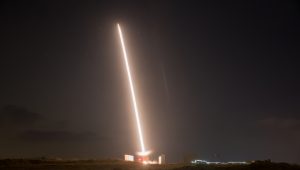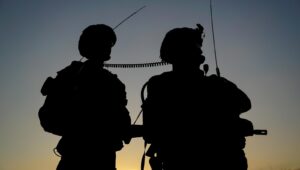The following interview was conducted in late October, shortly after the return of Yocheved Lifshitz, 85, and Nurit Cooper, 79, from Hamas captivity and before the launch of the IDF ground operation in Gaza.
Maj. (res.) A., a combat navigator in Squadron 105 based at the Ramat David Air Base, southeast of Haifa, and a medical student, has a ritual before boarding an F-16 plane. She goes around the formidable aircraft, examining the wings, wheels and missiles, while braiding her red hair into a long braid. Only then does she climb the metal ladder, take the seat behind the pilot and tuck her braid into her uniform.
She did the same on Oct. 7, after arriving at the base on the day of the Hamas terrorist organization’s surprise onslaught in the western Negev. Earlier that morning, A. and her fiancé, Capt. R., who serves in the same squadron, managed to get to the bomb shelter moments before a Hamas rocket struck not far from their apartment.
Immediately afterwards, the two hurried off to their squadron, R. as a pilot and A. as a volunteer reservist who did not wait to be called up. While Israelis were glued to their screens watching the atrocities unfold, A. was in the sky in a jet equipped with smart bombs.
“No one in my family knew yet that the day before the war, on a Friday, we finalized an event hall for our wedding, scheduled in six months,” A. related. “It feels like a few years have passed since then, not three weeks. My whole life has turned upside down.
“One minute I’m busy with the wedding and university, and the next I’m over Gaza, aiming bombs at strategic Hamas targets.”
Since Oct. 7, A. has conducted dozens of sorties, several times a day, most of them at night. She participated in the destruction of terrorist infrastructure and the targeted killing of senior Hamas officials. The 105 “Scorpion” Squadron destroyed dozens of terrorist sites including high-rise towers that housed Hamas assets.
Participating in the same operation is one of 105 Squadron’s veterans, Lt. Col. T., 36, who prepares the pilots for two war zones—Gaza and Lebanon.
“With the feeling of pain and loss, there is also a feeling of strength,” T. said. “The aircrews understand the mission and strongly believe that we will win. Tens of thousands of fighters are on the borders, and we need to remind ourselves we are the strongest country in the Middle East. If the campaign in the north develops into a war, there will be missiles and deaths, but the balance of power cannot be compared.
“I have no doubt that we are going to win. We will bring this to an end for our children, change the situation in the Middle East, and return the residents of southern Israel to their homes. This is the goal.”
‘I have to be focused’
A lot has been said about the Hamas attack and the heroism of the standby units and the civilians in the south. The Ramat David base was among the first to dispatch fighter jets to the border to bomb Hamas targets and try to stop the terrorist onslaught on Israel.
A. and R. got to the squadron around 8:30 a.m. Half an hour later, she was sitting in an F-16 and within minutes was flying over Gaza, navigating the aircraft.
Q: Do you think about the Israeli hostages while over the skies of Gaza?
“On my first flight in the war, I made a mistake and concentrated on the safety of family members from the south.
“I have to be focused on the mission. That’s why in the first week I rarely watched the news. My agenda is to attend briefings, fly, eat and sleep. It’s hard for me to hear the stories, so I disconnected. As part of the pilots’ course, we simulated being captured, and it is excruciating to imagine children and civilians being in such situations.
“That Saturday, like most of the military personnel whose job it is to protect the country, I felt that we did not live up to our contract with the citizens of Israel. Since then, every time I get on a plane in preparation for an attack, I have the feeling that I am helping and restoring what should have done in terms of defense.”
Q: What kind of strikes do you participate in?
“We hit whatever is necessary: buildings, senior Hamas members, infrastructure, military posts, weapons.”
Q: What does it feel like striking senior Hamas terrorists?
“The people behind the massacre need to pay the price. Damage to the weapons, infrastructure and buildings is important, but in the end, the decision-makers stand behind the attack and we are settling a score.”
Q: Can you see from the jet what state Gaza is in?
“During the day, you can clearly see the buildings—the destruction, the smoke and the dust after the bombing. At night we see below us the launches [of missiles by Hamas] and interceptions [by the Iron Dome aerial-defense system] and the explosions when the two collide. In the past, you could see the lights of Gaza’s houses, but now it is quite dark.
“Compared to previous rounds, such as “Operation Protective Edge” [in 2014] and Operation Guardian of the Walls [in 2021], we are more aggressive. We erase everything that belongs to Hamas while making sure to evacuate civilians. I’m glad that the IDF goes out of its way to prevent civilian casualties in Gaza, despite the atrocities that Hamas committed against innocent Israelis.”
T. added, “No one wants to kill innocents, and we do everything we can to avoid that. You have to maintain your values even during the war.
“Nevertheless, something has changed in the country with regard to our enemies. In the past, before any attack in Gaza, we would provide a warning by “knocking on the roof” and would even give up on hitting terrorists. Now it’s a war situation against a murderous and cruel enemy that spares no means, so it’s a different situation.
“They do not knock on the roof anymore but do ask the citizens to move south so that they will not be harmed. The effort is focused on moving the population because the area is becoming a war zone. It is a military area, and those who stay there know that they are taking a risk.”
‘The right and moral thing’
Before the first checkpoint to Ramat David, there is an uncharacteristically long line of cars. Hundreds of civilians who served at the base as pilots or as technical staff are on their way to volunteer. A poster at the entrance of the base says, “We fight together, we win together.” Below is a large Israeli flag that can be seen by every pilot who takes off.
Ramat David, or as it is officially titled, “Kanaf 1,” houses three F-16 squadrons and one helicopter squadron. I meet everyone at the “Scorpion” Squadron.
T., who is married with two children with another one on the way, grew up in a military family. His father held a senior position in the Armored Corps as did one of his brothers. T. was promoted to squadron commander in January this year.
“We are focused on the mission and focused on the goals, but we are also human beings who were shocked by the descriptions of atrocities,” he said. “We talked about it in the squadron and there is no doubt that we are all in the middle of this national trauma. The pain and loss are those of the entire nation and what the right thing to do is clear to everyone.
“Not only the pilots showed up here in full strength, but also the ground crews. This is the people of Israel at its best. We received a painful blow and everyone understands what needs to be done.”
Q: Besides eliminating senior Hamas officials, are there any attempts to hit missile launch sites that are a major disruption for life in Israel?
“The main effort right now is to hit Hamas terrorists and prepare the area for the ground operation. We are hitting the headquarters and anything that could hinder our forces from fighting in Gaza.”
Q: And what about the residents of Ashkelon or Ashdod, who are targeted by rocket fire every day?
“The launch graph is in significant decline, and it is clear that we do not want missiles to hit the home front. The main operational solution is to strike at Hamas operatives. We disrupt their ability to command and control.
“The purpose of the fighting, as directed by the government and decided by IDF Command, is to dismantle Hamas’s operational capacity. Hunting every launcher and stockpile of ammunition is not effective.”
Q: How come?
“Because they are very scattered and because we have Iron Dome, which does an excellent job. In places where there is a mass of rocket launchers threatening our forces, we do attack.”
T. showed me video footage of two strikes on Hamas targets in Gaza in which smart bombs were used.
“There were private homes around, so we had to be careful and the hit needed to be precise,” T. explained. “The achievements of the Air Force are significant. We are with the soldiers on the ground in full force.”
Q: Does it affect the pilots that the exact location of Israeli hostages held in the Gaza Strip is unknown?
“It’s a difficult question. We are in a war for which we have been preparing for 30 years and one of the significant challenges is to put our thoughts aside, including concerns for the family. The overall picture is important and we need to concentrate on the mission. You cannot fly thinking ‘what if.’
“Difficult things can happen in war and you cannot hesitate before every bomb is dropped. If something difficult happens, we will know how to deal with it. We are doing the right and moral thing in Gaza. We have no other solution.”
Q: The northern border is also escalating. Is the IDF ready for two war arenas?
“The military has been preparing for a multi-arena war in recent years. Currently, there is a state of war in the south, and the northern arena is secondary. These are mainly exchanges of missile fire. The IDF thwarts infiltration attempts and anti-tank fire and there are quite a few achievements, such as 30 Hezbollah operatives who were eliminated. The squadron is also ready for the northern sector.”
Q: And how are the arenas different?
“The level of threat to the warplanes from Lebanon is high and significant, in contrast to Gaza, but it does not harm the sense of security. At the moment, Hezbollah is focused on hitting military targets, so we react in the same way and attack observation posts and anti-tank crews.
“At the same time, Israeli settlements have been evacuated, with the understanding that the arena could catch fire and we don’t want a repeat of Oct. 7 in the north. The air force is fully prepared for this.”
A. is no stranger to the Lebanese border either. “I go wherever I am sent and the squadron participated in all the arenas,” she said while taking the navigator’s seat. She explained the instruments to me and showed me the stick the navigator could use to take over the plane in the event the pilot is injured.
Q: Don’t you feel a little lonely here? You cannot see the pilot because of this computer.
“It’s a two-seater plane and we’re a team by all means. There are single-seat planes where it feels lonely. The navigator communicates with the pilot and is responsible for the armament, with the exception of smart bombs that steer themselves.
“In the past, a navigator could steer the plane, but today the mission is different, mainly operating sophisticated cameras and systems.”
Q: What does it feel like to drop a bomb?
“You can physically feel the jet get lighter. It’s checking that the bomb reaches its destination that is important.”
Growing up, A. was not sure whether to become a pilot or a doctor. She now combines the two by studying medicine and volunteering at 105 Squadron, where she and her fiancé stand on the front line of Israel’s defense.















